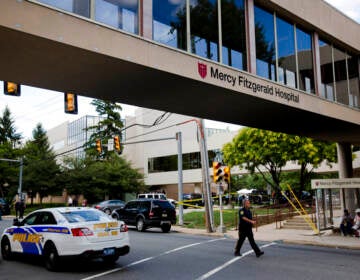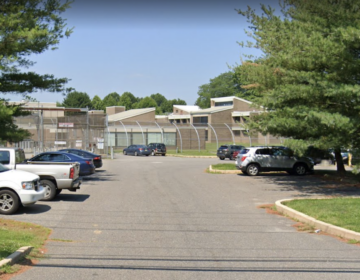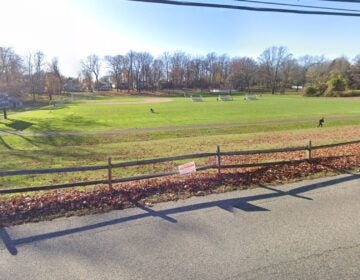Delaware County law enforcement plans to build a ‘real-time crime center’
The law enforcement community envisions eventually asking the public to give police live access to their own private security feeds.
Listen 1:10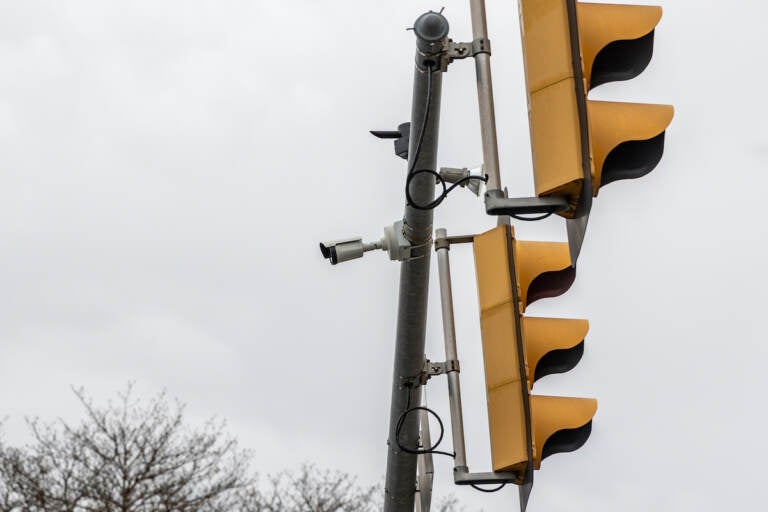
A security camera points up Tilghman Street at its intersection with 9th Street in Chester, Pa. (Kimberly Paynter/WHYY)
Got a question about life in Philly’s suburbs? Our suburban reporters want to hear from you! Ask us a question or send an idea for a story you think we should cover.
Delaware County law enforcement officials want to put eyes in the sky. The Delaware County District Attorney’s Office is expanding its contract with Fusus, a Georgia-based surveillance technology company, to establish a “real-time crime center.”
The plan, which is in its early stages, is to install cameras in “high-crime” areas of the county — like the city of Chester, Chester Township, Chichester, Eddystone, and Marcus Hook.
But Delaware County’s law enforcement community have even loftier goals. Their vision is to eventually ask the broader public to share their own private security camera feeds to law enforcement’s opt-in cloud system.
To date, there haven’t been any county-wide public input meetings to discuss these plans nor is there much available information on the existing infrastructure.
Democratic District Attorney Jack Stollsteimer briefly mentioned the undertaking to Delaware County Council at a recent public meeting, while advocating for the government body to accept a $1 million grant from the Pennsylvania Commission on Crime and Delinquency. The bulk of the money will be used to fund even more street poles, Fusus cameras, and software.
“We are working right now with a platform that will go up with a website that will allow everyone in the community, starting in Chester, and then eventually across the county, who has a camera, security camera, who wants to share it with law enforcement, to use this platform, to share it with us in real-time,” Stollsteimer said.
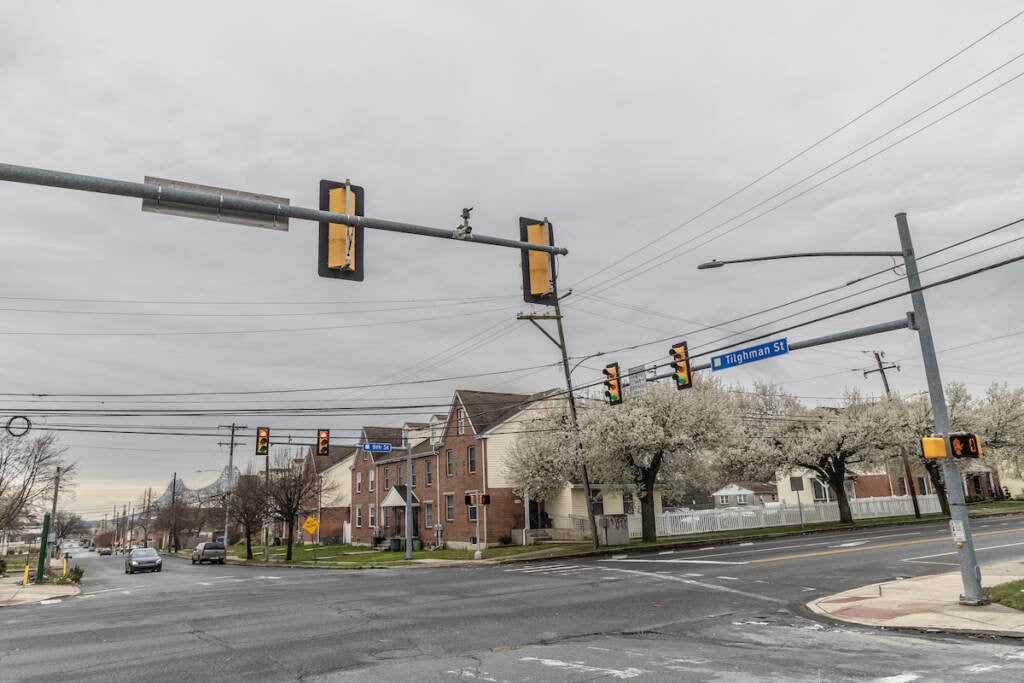
Officers and investigators would be able to see the video from either their phone or a centralized viewing location. Stollsteimer described the ability to observe camera footage in real-time as a “force-enhancer,” permitting quicker arrests and less time searching for and requesting evidence.
“We’ll be giving a briefing when we’re a little further along in the process for all of you on council and then asking for your help as we ask the community to become part of the real-time crime center,” Stollsteimer said.
A spokesperson for the county District Attorney’s Office declined WHYY News’ request for an interview.
A growing number of local law enforcement agencies across the United States want to build surveillance networks in the name of public safety. However, their desire to embrace surveillance has been met with pushback from some communities and privacy advocates.
Local law enforcement discovered Fusus from Minneapolis Police following George Floyd killing
James Nolan serves as the chief of the Criminal Investigative Division of the DAO, but he previously worked as the chief for the Chester Police Department.
In an October 2022 podcast episode with the company, Nolan said he first heard of Fusus and their products in the aftermath of the Minneapolis Police killing of George Floyd.
“During the George Floyd incident, which, again, we could go on for days about what happened there, but the thing that I most benefited from was I found out that they had this system in Minneapolis that fused camera technology. So in a moment of curiosity I called there, asked what they use, and they directed me to Fusus. And I was astounded,” Nolan said.
With the help of Stollsteimer, Nolan rolled out the technology in Chester. He claims the department solved “two or three murders, a kidnapping, and a shooting within the first two weeks of having it up and running.”
“Since the advent of the automobile, this is the biggest technological advancement in police work because the car put us some place quick — this puts us everywhere all the time, even when people don’t want to cooperate with us,” Nolan said.
Nolan said cameras would only be placed in public spaces.
When Stollsteimer pulled back the curtain on their aspirations of a county-wide program in the March council meeting, he also mentioned Chester’s violence reduction rate.
For nearly three years, the county District Attorney’s Office has placed notable scrutiny on Chester. Stollsteimer, community organizations, and city officials collaborated to form the Chester Partnership for Safe Neighborhoods.
Local, county, and even state officials like then-Attorney General Josh Shapiro have since touted the success of the program. The District Attorney’s Office has levied the goals and progress of the program to advocate for more funding.
Since 2022, Delaware County has licensed and purchased several Fusus products including Fusus Real-Time Crime Center in the Cloud (RTC3) system, FususCORE, and cameras. Fusus also offers an artificial intelligence system which allows for “automating detection capabilities.” Delaware County has not licensed this product.
Fusus did not respond to a request for comment.
Privacy expert: ‘This looks a lot like mass surveillance’
The Electronic Privacy Information Center (EPIC) is a nonprofit research organization based in D.C. focused on emerging privacy issues. Jeramie Scott, senior counsel at EPIC and director of their project on surveillance oversight, has seen his fair share of similar programs across the country.
“My first impression of looking at the funding for this project is that this looks a lot like mass surveillance,” Scott said.
Scott said mass surveillance is antithetical to democracy.
“What mass surveillance ends up doing is not only undermining our privacy rights and our civil liberties, but undermining our democracy, our democratic values. And it also ends up being a crutch for other issues. It’s a crutch for bad social policies, because mass surveillance doesn’t stop crime,” Scott said.
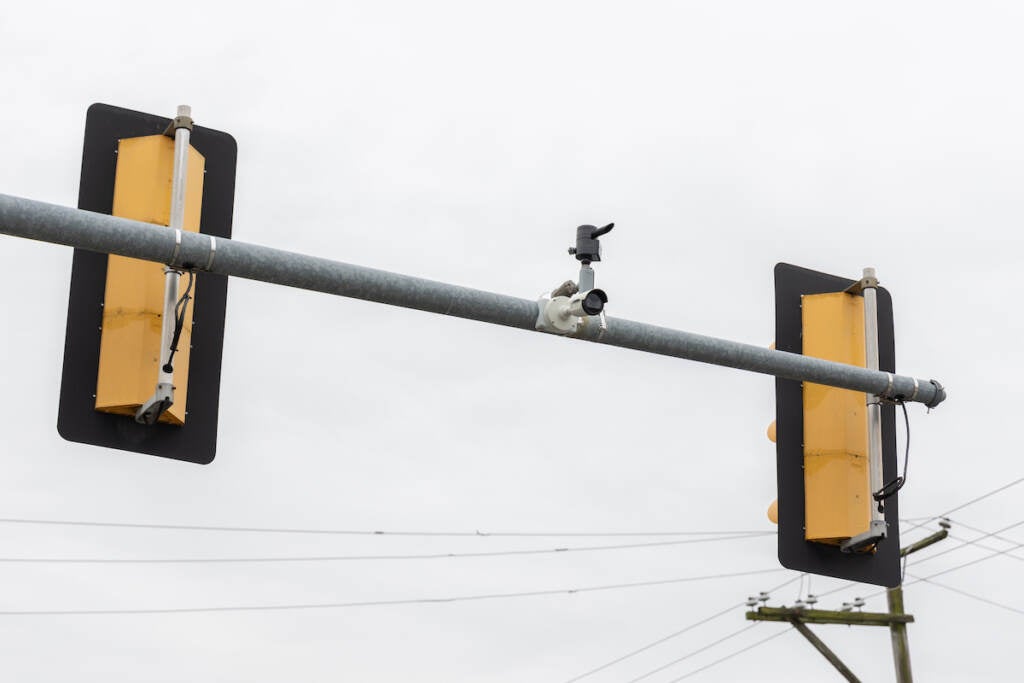
Historically, Scott said communities of color are often the “testing ground” for surveillance technology. He said the issues with oversight and accountability can disproportionately impact these communities.
And as technology advances and time passes, Scott believes these programs bring another issue into the picture.
“No matter what the initial justification for it is, it almost inevitably leads to mission creep. So there will be an expanding number of uses for the real-time crime center that will kind of creep along as time goes by. And what started off maybe as a smaller program focused on a particular issue ends up being a much larger program, focused on a lot of different issues that weren’t part of the original purpose for the program,” Scott said.
Scott said the community should make the decision upfront whether they want to implement a real-time crime center as opposed to law enforcement getting funding from a grant program and imposing it without community approval.
Council president: ‘The goal is to reduce crime’
Council President Dr. Monica Taylor told WHYY News the architects of the program are taking their time as they create the infrastructure for a real-time crime center.
“With everything, I think it’s all about how you build it out. And I commend our District Attorney’s Office because they have been working on this and kind of thinking it out as a long-term project. So it’s not, ‘we’re implementing it really quickly.’ We’re trying to do it in phases so that we can really monitor and see where there might be barriers, where there might be hurdles, where we should be adjusting the system, and adjusting how we’re monitoring the system versus trying to do it all at once,” Taylor said.
Taylor said a smaller pilot model gives the county the ability and flexibility to ensure they are weighing any concerns ahead of time.
While this project was in an earlier phase, Taylor said the District Attorney’s Office provided evidence how the usage of cameras in Chester has helped them close cases.
“The goal is really to just make sure that we can respond as efficiently and effectively as possible to crime that’s happening in Delaware County, but building it out slowly so that we can make sure that we are keeping policy decisions in mind and making sure we’re building the system in the best way for our stakeholders, our communities, and our first responders who will be responding on the scene,” Taylor said. “The goal is to reduce crime.”
History of surveillance in Delco
Back in 1971, a group of local antiwar activists raided a small FBI field office in Media and slipped away unnoticed with more than 1,000 confidential documents.
The publicization of the files revealed the FBI’s widespread surveillance operation, specifically their illegal COINTELPRO project that aimed to disrupt various civil movements and target notable leaders such as Martin Luther King Jr. and Malcolm X.
According to Betty Medsger, the former Washington Post reporter who initially broke the story more than 50 years ago, one of the more eye-opening local revelations was the FBI’s interest in surveilling “every Black student” at Swarthmore College.
The county District Attorney’s Office’s interest in accessing the security cameras of residents and business owners began in 2018 under former Republican District Attorney Katayoun Copeland. The DA DelCam program allowed people to register their private camera systems to a county database.
In the event of an emergency, police could search the database and reach registrants to request their video.
Given the history of surveillance in the U.S. and its potential for abuse, if not properly monitored, the American Civil Liberties Union drafted the Community Control Over Police Surveillance (CCOPS) model bill “to promote transparency, the public’s welfare, civil rights, and civil liberties in all decisions regarding the funding, acquisition, and deployment of surveillance equipment by local police departments.”
Real-time crime center meets public outcry elsewhere in U.S.
The county is far from alone in its interest in police surveillance technology. EPIC recently found COVID-19 relief money has helped drive an influx of police surveillance.
Regardless of the funding stream, the debate over whether to embrace surveillance or not has been fierce in some municipalities. In Columbia, Missouri, city officials and residents have clashed in recent months over the possible introduction of a real-time crime center.
Upon seeing the Columbia Police Department’s proposal, the Mid-Missouri Civil Liberties Association sent a letter in October 2022 expressing concern about their own proposed version of a real-time crime center.
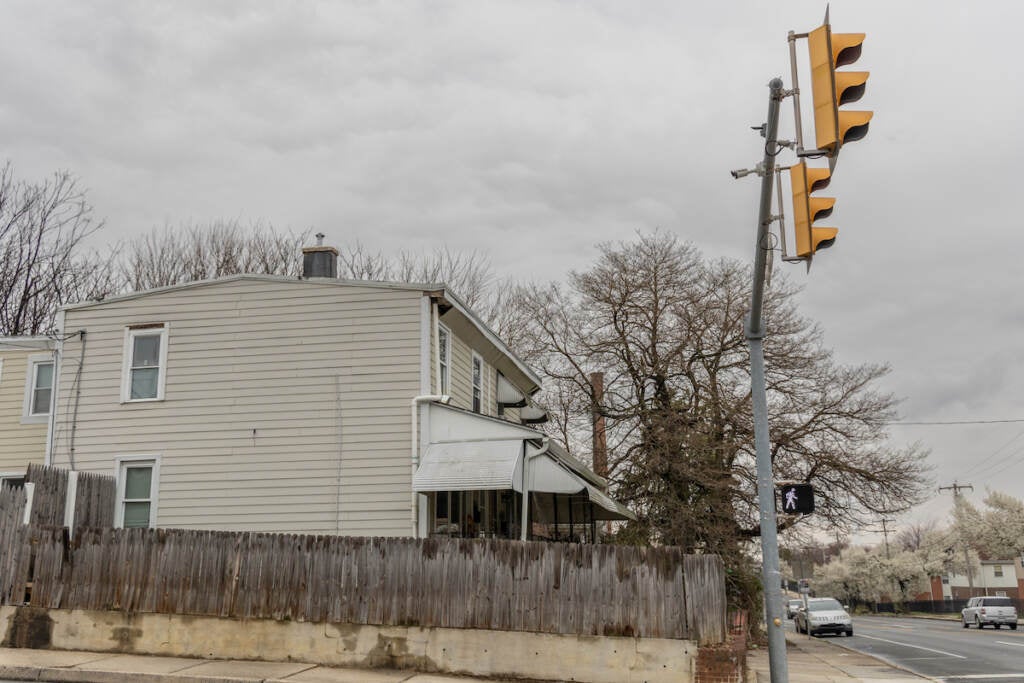
Dan Viets, president of the organization and a practicing attorney, told WHYY News he believes the adoption of surveillance technology is an infringement on personal privacy and liberty.
“There should be transparency, openness, and accessibility to all information about what our government is doing. But when our government seeks to surveil us, they should meet a very high burden of showing, first off, that the surveillance is going to accomplish some worthy goal. And I think it fails on that measure,” Viets said.
While Columbia City Council narrowly voted against immediately adopting the technology in November 2022, the government body voted unanimously in regards to possibly using a community group to oversee police use of the software, if ever adopted in the future.
Anthony Willroth is a business owner in Columbia. He first found out about their proposed real-time crime center from his wife, who sits on the board for the Commercial Improvement District in downtown Columbia.
“There’s nothing that can make me comfortable with it, even if you take the opportunity for outright abuses of the system out of the police’s hands through their policies,” Willroth said.
He said he’s worried about the potential for the infrastructure to be used by federal law enforcement agencies who have working relationships with local police.
Discussion over the program is expected to begin soon, starting with the introduction of an ordinance highlighting First Amendment and non-discrimination clauses and protections.

Get daily updates from WHYY News!
WHYY is your source for fact-based, in-depth journalism and information. As a nonprofit organization, we rely on financial support from readers like you. Please give today.



